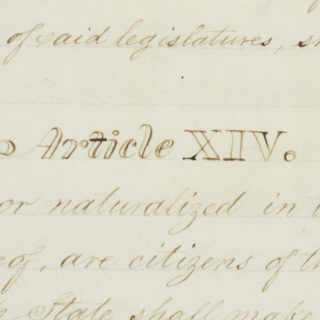The 14th Amendment 1866
The 14th Amendment has been called “the Second Constitution” for the ways it fundamentally changed the nature of the Federal Government. The Citizenship Clause defined national citizenship to include anyone born in the United States—overturning the Dred Scott decision. The Due Process Clause made most of the Bill of Rights applicable to the states—empowering the courts to enforce rights violations against state governments. The Equal Protection Clause required that state laws protect the “life, liberty, and property” of all citizens equally. In the first century of its existence, the 14th Amendment was violated repeatedly. Beginning in the 1920s, it became the basis of many landmark Supreme Court decisions—eventually serving as the constitutional foundation of the civil rights movement.
